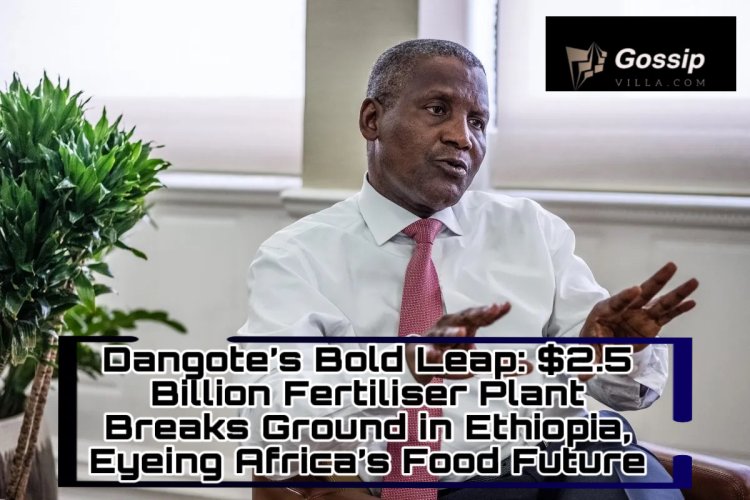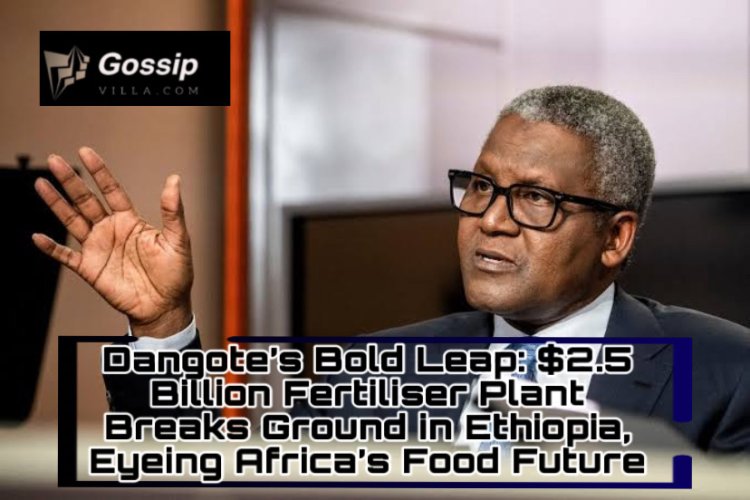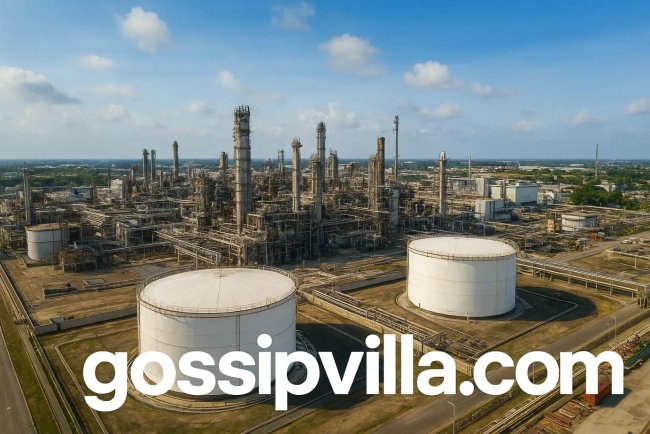Dangote’s Bold Leap: $2.5 Billion Fertiliser Plant Breaks Ground in Ethiopia, Eyeing Africa’s Food Future
Aliko Dangote has launched a $2.5 billion fertiliser plant in Gode, Ethiopia, aiming to produce 3 million tonnes of urea annually.

Dangote’s Bold Leap: $2.5 Billion Fertiliser Plant Breaks Ground in Ethiopia, Eyeing Africa’s Food Future
In a move that’s set to reshape Africa’s agricultural landscape, Nigerian billionaire Aliko Dangote has officially kicked off construction on a massive $2.5 billion fertiliser plant in Ethiopia. This isn’t just another industrial project—it’s a strategic powerhouse designed to produce 3 million tonnes of urea annually, potentially turning Ethiopia into a fertiliser export hub for the continent. As Africa grapples with food insecurity and soaring fertiliser import costs, this initiative promises jobs, self-sufficiency, and a greener path to growth. Let’s dive into the details of this exciting development.
The Groundbreaking Ceremony
The project officially broke ground in Gode, a town in Ethiopia’s Somali region, during a high-profile ceremony attended by Dangote himself and Ethiopian Prime Minister Abiy Ahmed. This joint venture between Dangote Group and Ethiopian Investment Holdings marks the second major collaboration between the two nations, following Dangote’s successful 2.5 million tonnes per annum (Mta) cement plant in Mugher, which has been operational for over a decade.
Aliko Dangote, Africa’s richest man and founder of the Dangote Group, didn’t hold back on his vision. “This plant is not just about building infrastructure; it’s about securing Africa’s food future,” he declared, emphasizing how the facility will leverage Ethiopia’s vast natural gas reserves from the Calub and Hilala fields via a dedicated pipeline. Prime Minister Abiy echoed the sentiment, calling it a “game-changer” for Ethiopia’s economy and a step toward reducing the country’s heavy reliance on imported fertilisers, which cost billions annually.

Who is Aliko Dangote?
If you’re new to the name, Aliko Dangote is more than just a businessman—he’s a force of nature in African industry. Starting from a small trading firm in the 1970s, Dangote built an empire that spans cement, sugar, oil refining, and now fertilisers. His $20 billion Dangote Refinery in Nigeria is already the world’s largest single-train facility, but his eyes are firmly on intra-African growth.
Dangote’s philosophy? “Africa for Africans.” By investing in local resources and talent, he’s not only creating wealth but also fostering self-reliance. This Ethiopia project aligns perfectly with that ethos, building on a memorandum of understanding signed earlier this year between Dangote Industries and the Ethiopian government. It’s a testament to how private capital can bridge gaps in public infrastructure, especially in a continent where agriculture employs over 60% of the workforce yet struggles with low yields due to fertiliser shortages.
Inside the Project
At its core, the Dangote-Gode Fertiliser Plant will be one of the world’s largest single-site urea production complexes. Spanning advanced production facilities, it will harness natural gas to manufacture high-quality urea, a key nutrient for crops like maize, wheat, and rice. The plant’s 3 million-tonne annual output could meet domestic needs and export surplus to neighboring countries, slashing transport costs and carbon footprints compared to imports from distant suppliers like Russia or Morocco.
Construction is already underway, with completion targeted for late 2027 or early 2028, depending on supply chain logistics. The site in Gode was chosen for its proximity to gas fields—about 200 kilometers away—ensuring efficient energy supply without the need for imported fuels. Environmentally, the project incorporates modern emission controls, aligning with global sustainability goals while boosting Ethiopia’s green credentials.
What makes this stand out? It’s not a fly-by-night operation. Dangote’s track record in Ethiopia’s cement sector shows they deliver: that plant has created thousands of jobs and contributed millions in taxes. Expect similar ripple effects here, from skilled labor training to tech transfers that upskill local engineers.
Why Ethiopia?
Ethiopia isn’t a random pick—it’s a powerhouse in the making. As Africa’s second-most populous nation, it has over 15 million smallholder farmers who produce 95% of the country’s food but face chronic fertiliser deficits. The Horn of Africa giant imports nearly all its urea, spending up to $1 billion yearly—a drain on forex reserves amid ongoing economic reforms.
By building locally, this plant could cut those costs by 50% or more, freeing up funds for education, health, and infrastructure. Plus, Ethiopia’s recent opening to foreign investment under PM Abiy’s administration makes it an attractive destination. The country’s vast arable land (only 15% cultivated) and ambitious Green Legacy Initiative for reforestation and soil health pair perfectly with increased fertiliser access.
The Bigger Picture
Let’s talk numbers. This $2.5 billion injection is expected to generate over 5,000 direct jobs during construction and 1,500 permanent roles once operational, many for locals in the Somali region—a area often overlooked in national development. Indirectly, it could support 100,000 farmers by stabilizing supply chains and prices.
On food security, the stakes are high. Africa loses $4 billion yearly to fertiliser shortages, exacerbating hunger for 278 million undernourished people. Dangote’s plant could export to East Africa, reducing reliance on volatile global markets hit by events like the Ukraine conflict. It’s a step toward the African Continental Free Trade Area (AfCFTA) dream, where intra-African trade in agri-inputs surges.
Critics might worry about environmental risks from gas extraction, but early plans include robust safeguards, and Ethiopia’s push for clean energy balances that. Overall, it’s a win for sustainable development.
Reactions Pour In
Social media and industry watchers are buzzing. “This is what Africa needs—homegrown solutions,” tweeted one analyst. The International Fertilizer Association (IFA) hailed it as a “gamble worth taking,” positioning Ethiopia as a regional exporter. Even global investors see it as a signal of deepening African capital flows, with Dangote’s cross-border bets inspiring others.
The Road Ahead
As shovels hit the ground in Gode, the Dangote fertiliser plant isn’t just bricks and pipes—it’s a seed of hope for millions. By tackling root causes of food insecurity head-on, it embodies the kind of bold, collaborative action Africa craves. Will it deliver on its promises?
Sources
What's Your Reaction?




















